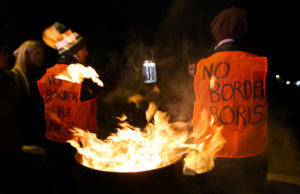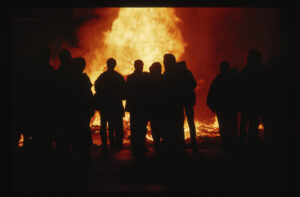Northern Ireland’s unionists have agreed to do what the Conservatives could not: pay the price for Brexit. The magnitude of this moment should not be underestimated, but nor should it be particularly celebrated. Right or wrong, the DUP’s decision to resume power-sharing after two years of protest at the Government’s original Brexit agreement marks the culmination of a long, grubby process from which almost no-one — save perhaps Jeffrey Donaldson, the DUP leader — emerges with much credit.
For most people, the idea that the DUP deserves any credit will come as something of a surprise. The standard interpretation of the past few years is that the DUP brought this settlement on themselves: they backed Brexit and must now swallow a sea border with Britain as a result. The reality few are willing to face, however, is that ever since the Brexit vote, the fate of Northern Ireland has been, at best, a secondary consideration for almost every actor in this distasteful drama.
Far from the DUP being to blame, every side — and I mean every side — has acted appallingly, including the Irish government and the European Commission. As such, the conclusion is not some grand settlement of which we can all be proud — but a tense, uneasy armistice which will have to be nurtured carefully over the coming years if it is not to wither and die. Perhaps the real tragedy is that it is still the best we could have hoped for.
Essentially, Rishi Sunak’s “Windsor framework” remains in place, though with added ameliorations to make it less noticeable. The DUP finally decided to accept this deal because, quite simply, there were no good alternatives left: it was Sunak’s deal with devolution, or Sunak’s deal without devolution. There was no option in which the Windsor framework was not part of the package.
Some loyalists in Northern Ireland would prefer to maintain a principled opposition to any divergence between Great Britain and Northern Ireland — in the hope that, eventually, a future government will have to renegotiate it. The reality, though, is this is a very long game. The prospect of a British prime minister unilaterally abandoning its agreement with the EU ended with the removals of Boris Johnson and Liz Truss.
And yet, here’s the great paradox: what we have today is Boris Johnson’s Brexit settlement, endorsed by all those who opposed and continue to loathe everything that Boris Johnson stood for. When push came to shove, Parliament overwhelmingly rejected Theresa May’s proposed Brexit settlement, in which Great Britain paid a higher price in sovereignty to reduce (but not remove) the Irish sea border. Instead, it endorsed Johnson’s alternative, in which the UK retains far more freedom to act independently of the EU at the cost of a harder sea border. Sunak’s achievement in office has been to negotiate — and, now, impose — various ameliorations to this Johnsonian settlement, to make it more palatable to unionism. But still, the settlement is Johnson’s, backed by both the Conservative and Labour parties.
From the moment this political settlement became obvious last year — when the House of Commons endorsed Sunak’s Windsor Framework — the DUP had no good options left. “We’d reached the bottom of the Celebrations tin,” as one influential voice within the DUP told me. “There were only Bounties left.”
This, in essence, was Jeffrey Donaldson’s central challenge as leader of the DUP. There was no point in waiting for a Labour government to emerge later this year because Keir Starmer had made clear that he was going to keep Sunak’s deal. The only alternative, then, was to hope that the Conservative Party lost the next election, replaced Sunak with someone prepared to rip up his agreement, and then won a majority to enact this plan at some point after 2029. Would voters in Northern Ireland really accept such a prospect? And so it was a Bounty or nothing. “Ah, the taste of paradise…” as my DUP insider put it. Quite.
For much of the past six years, the DUP has been mocked and maligned by the apparent grown-ups in London, Dublin and Brussels, who never miss an opportunity to advise what is in unionism’s best interests. In reality, with the decision taken on Monday night, it is now the DUP that has made the greatest sacrifice to settle Brexit.
The Irish government knew from the very beginning that the proposals they were pushing would not be acceptable to unionists and would therefore undermine the political settlement established by the Good Friday Agreement. And yet, they were not prepared to compromise themselves, whether that meant enforcing some controls on the sovereign border between Northern Ireland and the Republic — or, indeed, between themselves and the rest of the EU.
They made this choice because it was in their interest to do so. Britain’s statecraft, in contrast, was lamentable. Here, the Conservatives deserve particular scorn. And none more so than the supposed “Spartans”, who were so unshakable in their defence of British sovereignty — until a compromise emerged that meant only Northern Ireland had to take the pain.
The first challenge for the DUP, from here, will be to maintain party unity through the arduous process of re-establishing power-sharing. It has just had to swallow a large dose of particularly bitter medicine, and there will be little appetite for more. If Donaldson loses the party in the coming weeks, or indeed the wider unionist community, there is little hope of Stormont returning anytime soon, if at all. In 1973, when Ted Heath negotiated a power sharing deal acceptable to unionist leaders, it was soon brought down by grassroots opposition. In the end, devolved government would not return to Northern Ireland for another quarter of a century.
According to those who were at the DUP’s meeting on Monday night, a sense of realism descended on proceedings. The leadership had set seven tests for the UK government to meet before it would consider going back into Stormont. Those at the meeting said it was obvious the party had achieved something on each test, but not enough to have met them all clearly. The crucial point rammed home, however, was that there was “no identifiable path to anything more”, as one insider put it to me. In other words, they had reached the end of the road: it was this or nothing.
Another insider in the room added that even the hardliners in the party — Nigel Dodds and Sammy Wilson — were “measured and honest” in their remarks. Both recognised there was no perfect solution. “A lot of it came down to [the fact that] we can’t trust the Tories,” they said. “But by not doing something, we leave them [the Tories] in charge of everything.”
Herein lies the predicament of Northern Irish unionism. When the interests of the British state come into conflict with the interests of Northern Ireland’s unionists, there is only ever going to be one winner. And so the battle for unionism is never-ending: to protect its place in a union where it does not trust its interests will be protected.
The upshot is a settlement that reflects the uneasy, complicated nature of Northern Ireland — and one that defies all the usual canards spouted about the place. Northern Ireland has not emerged with no borders, but with two. Its economy has not been integrated into Ireland’s, but remains largely dependent on the British state and Britain’s internal market.
Unionism has suffered a painful defeat, but it lives to fight another day. “Bank it and build it,” Donaldson urged the DUP on Monday night. This is now the plan. So expect more battles to come: this is the never-ending reality of Northern Ireland.
Disclaimer
Some of the posts we share are controversial and we do not necessarily agree with them in the whole extend. Sometimes we agree with the content or part of it but we do not agree with the narration or language. Nevertheless we find them somehow interesting, valuable and/or informative or we share them, because we strongly believe in freedom of speech, free press and journalism. We strongly encourage you to have a critical approach to all the content, do your own research and analysis to build your own opinion.
We would be glad to have your feedback.
Source: UnHerd Read the original article here: https://unherd.com/




